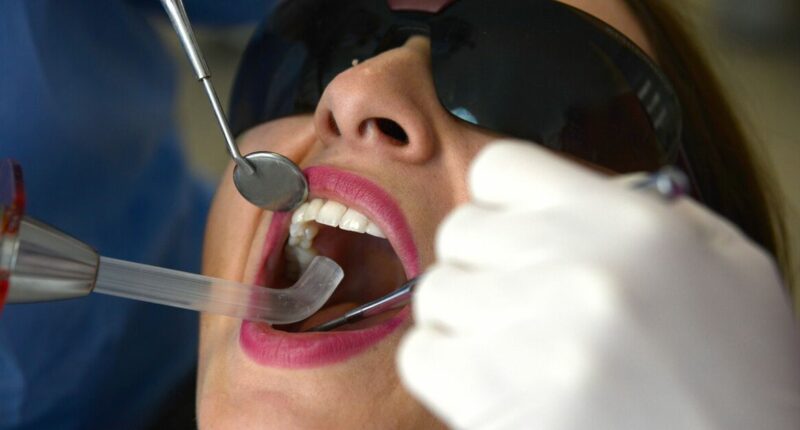Share this @internewscast.com
Visiting the dentist can provide insights into more than just dental health; it can indicate overall well-being, uncovering signs from stress to digestive problems.
Dr. Kabir Bhogal, the Founder and Principal Dentist at Revive Clinic, points out that beyond identifying cavities and performing cleanings, subtle oral changes can signal potential health issues like digestive troubles or nutrient shortages. Interestingly, many conditions initially present themselves through alterations in the mouth even before you experience any symptoms.
Dr Bhogal has shared 7 surprising things your dentist can tell about your wellbeing before knowing your medical history. This is what he says:
Jaw tension and tooth wear
Grinding or clenching your teeth, known as ‘bruxism’, is often an involuntary reaction linked to stress and anxiety. This stress response often manifests as jaw clenching or tooth grinding, leading over time to flattened tooth surfaces, jaw discomfort, and small fractures, especially on molars and front teeth.
When bruxism is not addressed, it can lead to TMJ disorders, affecting the joint connecting the jaw to the skull, which can then cause chronic headaches, facial discomfort, and difficulty in chewing. Alongside stress-reducing strategies, dentists might recommend custom-fitted night guards or dental crowns for extensive damage repair.
Gum inflammation
Periodontal disease, a condition affecting the gums and a primary reason for tooth loss, is readily identifiable by trained dentists. Smoking greatly heightens the likelihood of gum disease by reducing blood flow, compromising the immune system, and hindering tissue repair.
Regular dental visits can uncover the unseen consequences of smoking on oral health, often revealing gum disease risks before the smoker becomes aware.
Acid erosion
When the protective outer layer of the teeth (enamel) begins to wear away, it can be an early sign of chronic acid exposure. This can initially be spotted on the back of the teeth and often stems from undiagnosed gastroesophageal reflux disease (GERD), a condition where stomach acid repeatedly flows back into the oesophagus and even the mouth.
Dentists can usually detect this before a patient realises they have acid reflux, because the acid erosion weakens the enamel and makes teeth more vulnerable to cavities and cracks. This kind of damage can require restorative procedures like dental crowns to protect the affected teeth.
Dry mouth
While xerostomia (dry mouth) can result from factors like dehydration, stress, or medications, it’s also a common early symptom of diabetes. This is because diabetes can affect the salivary glands directly, impairing their ability to produce saliva. Additionally, high blood sugar levels cause the body to lose more fluids, leading to dry mouth faster.
Because saliva normally helps wash away food particles and neutralise oral acids, reduced saliva creates an ideal environment for bacteria to thrive and multiply more easily, increasing the risk of cavities and gum disease. There would usually be a noticeably dry, sticky texture in the mouth or sometimes a fungal infection like angular cheilitis (cracked lip corners) that may warrant a blood test.
Oral thrush
White patches or a creamy coating on the tongue and inner cheeks could be a sign of oral thrush, a fungal infection caused by an overgrowth of Candida, a type of yeast that naturally lives in the mouth. The immune system usually keeps oral bacteria growth under control, so when the body’s natural defenses are compromised, this allows the Candida to multiply.
This can be caused by conditions like HIV and autoimmune diseases, or even certain medication like antibiotics which disrupts the balance of normal bacteria in the body. Additionally ill-fitting dentures can worsen this issue by irritating oral tissues, creating a moist environment where yeast thrives. I would advise getting dental implants instead of dentures for long-term teeth replacement, as they are integrated into the bone and offer greater stability while preserving the neighbouring teeth.
Bad breath
Bad breath isn’t always a matter of brushing harder or more regularly. In reality, persistent bad breath, despite good oral hygiene or regular hygiene appointments, can stem from gastrointestinal problems.
A common cause can be Helicobacter pylori (H. pylori), a type of bacteria that infects the stomach lining with ulcers and produces sulfur compounds that contribute to a foul odour. Liver dysfunction can also manifest through the breath as it plays a vital role in metabolising nutrients and filtering toxins from the blood.
When it’s not functioning properly, waste products can accumulate and these toxins may then be released through the lungs, causing breath to smell unusually musty or metallic (‘fetor hepaticus’). Dentists can often tell the difference based on where the odour is coming from, how it smells, and whether it improves with oral care.
Pale tongue
A tongue that appears unusually pale or smooth can reflect a lack of essential vitamins and minerals, specifically iron, folate, or vitamin B12. These particular nutrients play a key role in maintaining healthy blood cells and supporting tissue repair and immune function, all of which directly affect your oral health.
Without enough of them, the soft tissues inside your mouth, especially the tongue, can become inflamed, thin, or prone to irritation because they aren’t getting the oxygen or nutrients they need. This could lead to discomfort, burning sensations, or even an increased risk of infection, all of which can worsen due to the delayed healing process caused by malnutrition. Dentists can help identify early signs of anaemia or related nutritional deficiencies, and may advise a further blood test with a general health practitioner.












